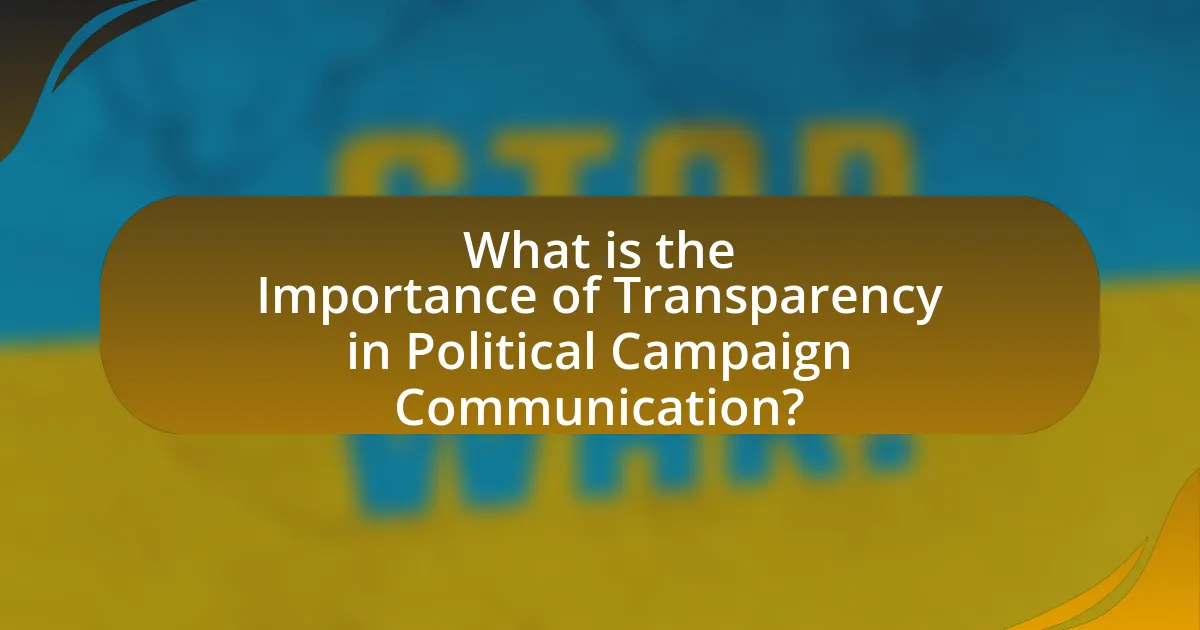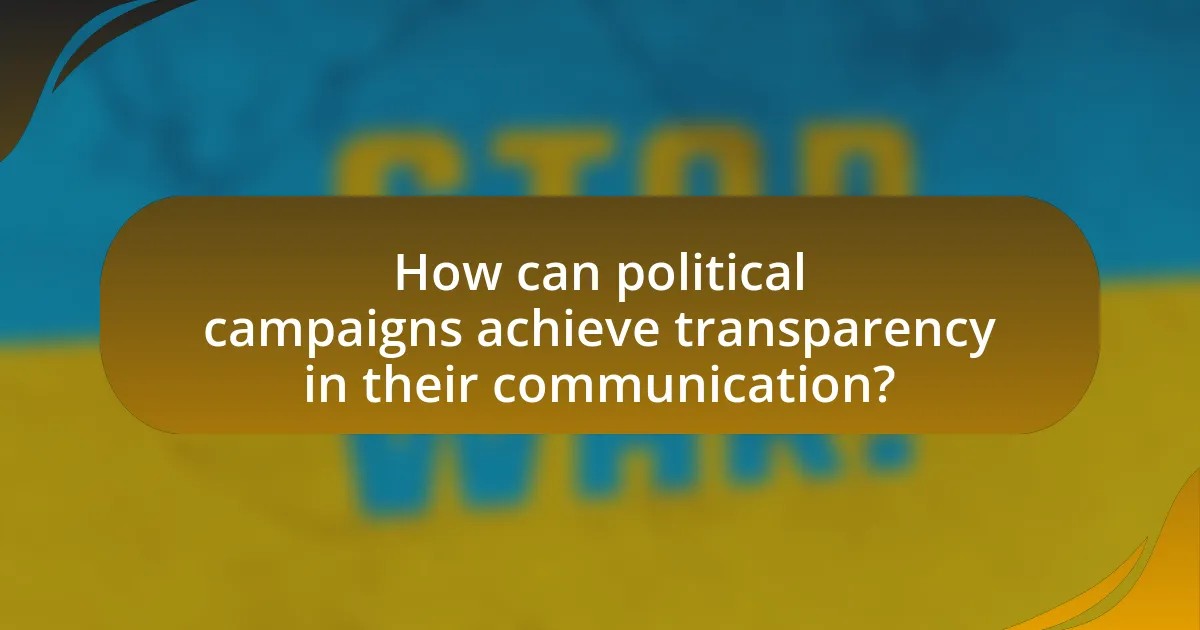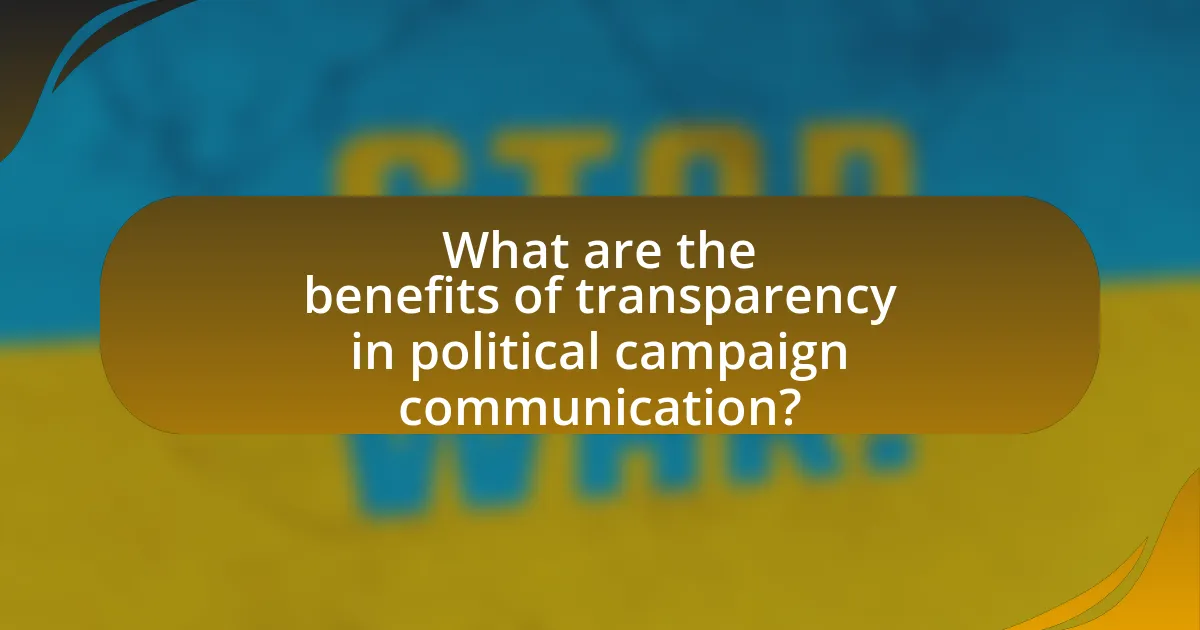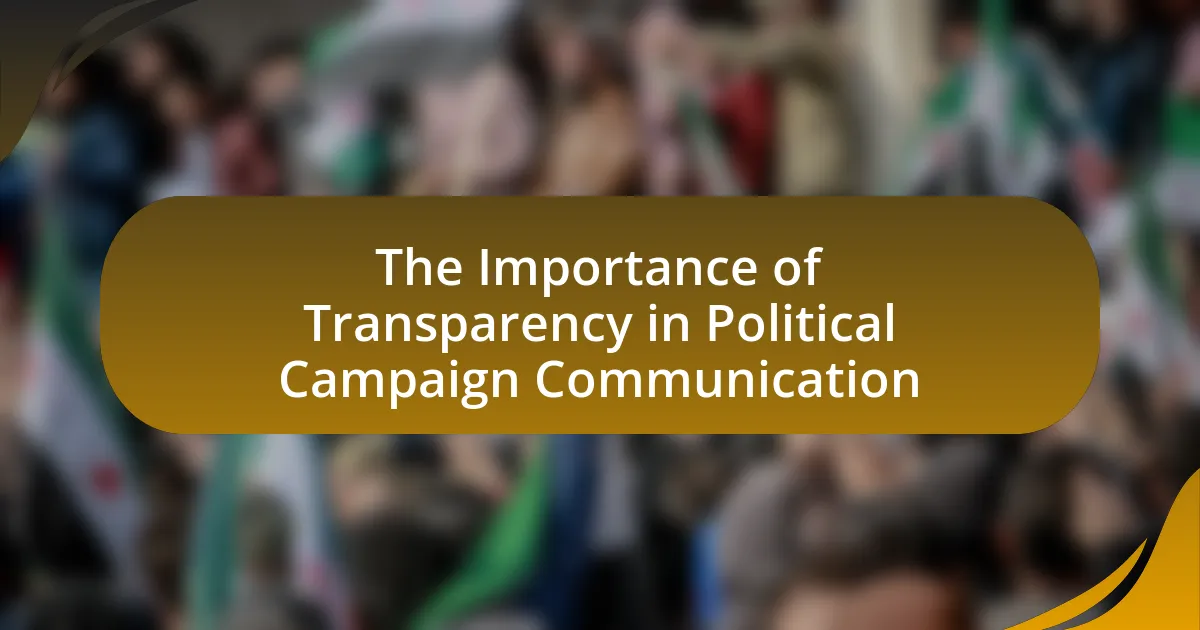The article focuses on the importance of transparency in political campaign communication, emphasizing its role in fostering trust between candidates and voters. It outlines key elements of transparency, including clarity, honesty, accessibility, and accountability, which enhance voter engagement and reduce misinformation. The article also discusses the impact of transparency on voter trust, democratic processes, and candidate credibility, while highlighting best practices for campaigns to achieve transparency, such as disclosing funding sources and utilizing digital platforms for communication. Additionally, it addresses the challenges campaigns face in maintaining transparency and the consequences of a lack of openness in political communication.

What is the Importance of Transparency in Political Campaign Communication?
Transparency in political campaign communication is crucial as it fosters trust between candidates and voters. When candidates openly share their policies, funding sources, and decision-making processes, it allows voters to make informed choices. Research indicates that transparency can lead to increased voter engagement; for instance, a study by the Pew Research Center found that 70% of voters believe that transparency in campaign financing is essential for a fair electoral process. Furthermore, transparent communication can reduce misinformation and promote accountability, as candidates are held responsible for their statements and actions. This accountability is vital for a healthy democracy, as it encourages ethical behavior among political candidates and their teams.
Why is transparency crucial in political campaigns?
Transparency is crucial in political campaigns because it fosters trust between candidates and voters. When candidates openly share their policies, funding sources, and decision-making processes, they enable voters to make informed choices. Research indicates that transparency can significantly enhance voter engagement; for instance, a study by the Pew Research Center found that 70% of voters consider transparency in campaign financing important when deciding whom to support. This level of openness not only helps to build credibility but also reduces the likelihood of misinformation and corruption, ultimately leading to a healthier democratic process.
What are the key elements of transparency in campaign communication?
The key elements of transparency in campaign communication include clarity, honesty, accessibility, and accountability. Clarity ensures that messages are straightforward and easily understood by the audience, which fosters trust. Honesty involves providing truthful information about campaign policies, funding sources, and candidate backgrounds, which is essential for maintaining credibility. Accessibility refers to making information readily available to the public, including campaign materials and financial disclosures, allowing voters to make informed decisions. Accountability means that campaigns must be willing to answer questions and address concerns from the public and media, reinforcing their commitment to transparency. These elements collectively enhance the integrity of the campaign process and promote voter engagement.
How does transparency influence voter trust?
Transparency significantly enhances voter trust by providing clear and accessible information about candidates, policies, and electoral processes. When voters perceive that information is openly shared and not concealed, they are more likely to believe that the electoral system is fair and that candidates are honest. Research indicates that transparency in political communication can lead to increased voter engagement and participation; for instance, a study by the Pew Research Center found that 70% of voters believe that transparency in campaign financing is crucial for trust in elections. This correlation suggests that when voters feel informed and included in the political process, their trust in candidates and the electoral system increases, ultimately fostering a healthier democracy.
What role does transparency play in democratic processes?
Transparency is essential in democratic processes as it fosters accountability and trust between the government and its citizens. When political actions and decisions are made openly, citizens can scrutinize and evaluate the behavior of their leaders, which is crucial for informed voting and civic engagement. For instance, studies have shown that countries with higher levels of transparency, such as Sweden and Denmark, tend to have lower levels of corruption and higher public trust in government institutions. This correlation underscores the importance of transparency in ensuring that democratic processes function effectively and that citizens feel empowered to participate in governance.
How does transparency affect voter engagement and participation?
Transparency significantly enhances voter engagement and participation by fostering trust in the electoral process. When voters perceive that information about candidates, policies, and electoral procedures is openly shared, they are more likely to feel informed and empowered to participate in elections. Research conducted by the Pew Research Center indicates that 70% of voters believe that transparency in campaign financing and candidate positions increases their likelihood of voting. This correlation suggests that when voters have access to clear and honest information, they are more inclined to engage actively in the democratic process.
What are the consequences of a lack of transparency in campaigns?
A lack of transparency in campaigns leads to decreased public trust and increased skepticism among voters. When campaign information is not openly shared, voters may perceive candidates as dishonest or manipulative, which can result in lower voter engagement and turnout. Research indicates that transparency fosters accountability; for instance, a study by the Pew Research Center found that 70% of voters believe that transparency in campaign financing is crucial for a fair electoral process. Additionally, the absence of clear communication can lead to misinformation spreading more easily, further eroding trust in the political system.

How can political campaigns achieve transparency in their communication?
Political campaigns can achieve transparency in their communication by consistently disclosing funding sources, campaign strategies, and policy positions. This practice fosters trust and accountability among voters. For instance, the Federal Election Commission mandates that campaigns report contributions and expenditures, ensuring that financial backers are publicly known. Additionally, campaigns can utilize digital platforms to provide real-time updates and engage in open dialogues with constituents, further enhancing transparency. Studies show that transparent communication correlates with increased voter trust and engagement, as evidenced by the 2020 U.S. presidential election, where candidates who openly shared their funding sources saw higher levels of public confidence.
What strategies can be implemented for transparent communication?
Strategies for transparent communication include establishing clear messaging, utilizing multiple channels for dissemination, and encouraging feedback from the audience. Clear messaging ensures that the information conveyed is straightforward and easily understood, which is crucial in political campaigns where clarity can influence voter perception. Utilizing multiple channels, such as social media, press releases, and public forums, allows for broader reach and engagement, ensuring that diverse audiences receive the same information. Encouraging feedback fosters a two-way communication process, allowing constituents to voice their concerns and questions, which can enhance trust and accountability. Research indicates that transparent communication in political campaigns can lead to increased voter trust and engagement, as evidenced by studies showing that voters are more likely to support candidates who communicate openly and honestly about their policies and intentions.
How can campaigns effectively disclose funding sources?
Campaigns can effectively disclose funding sources by implementing clear and accessible reporting practices that detail the origins of their financial support. This includes providing comprehensive financial statements that outline contributions from individuals, organizations, and political action committees, ensuring that this information is readily available on campaign websites and through public filings. For instance, the Federal Election Commission mandates that candidates disclose contributions over a certain threshold, which promotes accountability and transparency. By adhering to these regulations and proactively communicating funding sources, campaigns can build trust with voters and enhance their credibility.
What tools can be used to enhance transparency in messaging?
Tools that can enhance transparency in messaging include blockchain technology, which provides immutable records of communications, and data analytics platforms that track message dissemination and audience engagement. Blockchain ensures that messages are verifiable and tamper-proof, fostering trust among stakeholders. Data analytics tools, such as Google Analytics, allow campaign teams to assess the effectiveness of their messaging and ensure that information reaches the intended audience accurately. These tools collectively contribute to a more open and accountable communication process in political campaigns.
What challenges do campaigns face in maintaining transparency?
Campaigns face significant challenges in maintaining transparency, primarily due to the complexity of information management and the influence of external factors. The intricate nature of campaign financing, where funds may come from various sources, complicates the clear disclosure of financial backers. Additionally, the rapid dissemination of information through social media can lead to misinformation, making it difficult for campaigns to control their narrative and ensure accurate communication. Furthermore, legal regulations surrounding campaign disclosures can vary, creating confusion about what must be reported and when. These factors collectively hinder a campaign’s ability to present a transparent image to the public, as evidenced by numerous studies indicating that voters often express distrust in campaign communications due to perceived opacity.
How do misinformation and disinformation impact transparency efforts?
Misinformation and disinformation significantly undermine transparency efforts by creating confusion and eroding public trust. When false information spreads, it obscures the truth, making it difficult for citizens to discern accurate information about political campaigns. For instance, a study by the Pew Research Center found that 64% of Americans believe that fabricated news stories cause a great deal of confusion about the basic facts of current events. This confusion hampers the ability of voters to make informed decisions, ultimately compromising the integrity of democratic processes.
What are the legal and ethical considerations for transparency in campaigns?
Legal and ethical considerations for transparency in campaigns include compliance with election laws and the obligation to provide truthful information to voters. Campaigns must adhere to regulations such as the Federal Election Commission (FEC) rules in the United States, which mandate the disclosure of campaign contributions and expenditures. Ethically, campaigns are expected to communicate honestly, avoiding misleading statements that could distort public perception. For instance, the American Association of Political Consultants emphasizes the importance of integrity in messaging, asserting that transparency fosters trust between candidates and constituents. These legal frameworks and ethical standards are crucial for maintaining democratic integrity and ensuring informed voter decision-making.

What are the benefits of transparency in political campaign communication?
Transparency in political campaign communication enhances trust between candidates and voters. When candidates openly share their policies, funding sources, and decision-making processes, it fosters a sense of accountability. Research indicates that transparent communication can lead to increased voter engagement; for instance, a study by the Pew Research Center found that 70% of voters are more likely to support candidates who are open about their campaign financing. Additionally, transparency can reduce misinformation, as clear and honest communication helps voters make informed decisions based on accurate information.
How does transparency improve candidate credibility?
Transparency improves candidate credibility by fostering trust and accountability among voters. When candidates openly share their policies, funding sources, and decision-making processes, they demonstrate integrity and a commitment to honesty. Research indicates that voters are more likely to support candidates who are transparent, as it reduces uncertainty and perceived risk associated with their choices. For instance, a study by the Pew Research Center found that 70% of voters prioritize transparency in political communication, linking it directly to their perception of a candidate’s reliability and trustworthiness. This correlation underscores the importance of transparency in enhancing a candidate’s credibility in the eyes of the electorate.
What impact does transparency have on public perception of candidates?
Transparency significantly enhances public perception of candidates by fostering trust and credibility. When candidates openly share their policies, decision-making processes, and personal backgrounds, they are perceived as more honest and reliable. Research conducted by the Pew Research Center indicates that 70% of voters consider transparency a critical factor in their voting decisions, highlighting its importance in shaping public opinion. Furthermore, candidates who engage in transparent communication are more likely to attract support from undecided voters, as transparency reduces skepticism and builds a positive image.
How can transparency lead to better policy outcomes?
Transparency can lead to better policy outcomes by fostering accountability and trust between policymakers and the public. When government actions and decisions are open to scrutiny, it encourages informed citizen engagement and participation, which can result in policies that better reflect the needs and preferences of the community. For instance, a study by the World Bank found that countries with higher levels of transparency in governance experience lower levels of corruption and improved public service delivery, ultimately leading to more effective policy implementation. This correlation demonstrates that transparency not only enhances the legitimacy of policies but also promotes a collaborative environment where stakeholders can contribute to the policymaking process.
What best practices should campaigns follow to ensure transparency?
Campaigns should adopt clear communication, disclose funding sources, and provide regular updates to ensure transparency. Clear communication involves articulating campaign goals and strategies in an accessible manner, which fosters trust among constituents. Disclosing funding sources is crucial, as it allows voters to understand potential influences on the campaign; for instance, the Federal Election Commission mandates that candidates report contributions over a certain threshold, ensuring accountability. Regular updates on campaign progress and expenditures keep the public informed and engaged, reinforcing the campaign’s commitment to transparency. These practices collectively enhance credibility and foster a more informed electorate.
How can campaigns create a culture of openness and accountability?
Campaigns can create a culture of openness and accountability by implementing transparent communication strategies and fostering an environment where feedback is encouraged. By regularly sharing information about campaign decisions, funding sources, and policy positions, campaigns build trust with constituents. For instance, a study by the Pew Research Center found that 70% of voters value transparency in political communication, indicating that openness can enhance voter engagement and trust. Additionally, establishing mechanisms for public feedback, such as town hall meetings or online forums, allows constituents to voice their concerns and hold campaigns accountable, further reinforcing a culture of openness.
What role do social media and digital platforms play in promoting transparency?
Social media and digital platforms play a crucial role in promoting transparency by enabling real-time communication and information sharing between political entities and the public. These platforms allow candidates and political organizations to disseminate information directly, reducing reliance on traditional media, which can filter or distort messages. For instance, during the 2020 U.S. presidential election, platforms like Twitter and Facebook were used extensively for direct engagement, allowing voters to access unfiltered information about candidates’ policies and positions. This direct access fosters accountability, as public scrutiny increases when information is readily available. Additionally, studies have shown that transparency in political communication can enhance voter trust; for example, a 2019 study published in the Journal of Political Communication found that increased transparency through social media correlates with higher levels of public trust in political institutions.
What practical steps can campaigns take to enhance transparency?
Campaigns can enhance transparency by implementing clear communication strategies, such as regularly disclosing funding sources and expenditures. This practice allows voters to understand where financial support originates, fostering trust. For instance, the Federal Election Commission mandates that candidates report contributions and spending, which promotes accountability. Additionally, campaigns can utilize digital platforms to share real-time updates on campaign activities and decisions, ensuring that information is accessible and timely. By adopting these measures, campaigns can build credibility and encourage informed voter participation.
How can campaigns effectively communicate their values and commitments to transparency?
Campaigns can effectively communicate their values and commitments to transparency by utilizing clear messaging, consistent updates, and open channels for public engagement. Clear messaging involves articulating specific values and commitments in straightforward language, ensuring that the audience understands the campaign’s stance on transparency. Consistent updates, such as regular reports on campaign finances and decision-making processes, reinforce the commitment to transparency and build trust with constituents. Open channels for public engagement, including Q&A sessions and social media interactions, allow voters to ask questions and receive direct responses, further demonstrating the campaign’s dedication to transparency. Research indicates that campaigns that prioritize transparency can enhance voter trust and engagement, as evidenced by studies showing that transparent practices correlate with increased voter turnout and support.
What are the most common pitfalls to avoid in transparent communication?
The most common pitfalls to avoid in transparent communication include lack of clarity, inconsistency, and failure to listen. Lack of clarity can lead to misunderstandings, as ambiguous messages confuse the audience. Inconsistency undermines trust; when messages contradict each other, it raises doubts about the communicator’s reliability. Failure to listen prevents effective dialogue; ignoring feedback can alienate the audience and hinder engagement. These pitfalls are critical to recognize, as they can significantly impact the effectiveness of communication in political campaigns, where trust and clarity are paramount for voter engagement.
